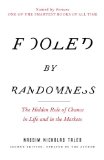It is not easy to put “Fooled by Randomness” by Nassim Nicholas Taleb into one of the standard book categories like “Business” or “Science” or “Philosophy”. This is because the book is about all of these and more. The main message of the book is that humans have an innate tendency to overlook the randomness of most of the events in their lives and they must learn to recognise this. Chance plays a much greater role in our lives than we are willing to believe. The success or failure of a person depends a lot on luck as well as the usual suspects like skills, hard work, risk-appetite, etc.
The book shows how probability is misunderstood by most people. People assign definite probabilities to events even when it is scientifically impossible to do so and then proceed to perform elaborate calculations based on such probabilities. Even when they have a fair idea of the probabilities people tend to take the wrong decisions because they forget to calculate the expected value of the possible outcomes. Many of the examples used to illustrate these statements are taken from the financial markets since the author is an options trader. The story of “Nero Tulip” seems somewhat autobiographical.
The author makes no attempt to hide his contempt for many people and for several commonly-accepted ideas. His motto is “to tease those who take themselves and the quality of their knowledge too seriously”. He reserves particular contempt for economists and journalists. The book has many “warnings against economists and finance professors as they tend to believe that they know something, and something useful at that”. He does not shy from rubbishing the typical MBA even though he holds an MBA himself. He thinks that journalists are primarily entertainers and asks you to stay away from those who are deluded into believing that they are thinkers.
If you think that this book will help you in profiting from the apparent randomness of the financial markets then you will be disappointed. It would help you to be on your guard while dealing with this randomness. The author points out that contrary to what most people think, randomness does not mean that there will never be any recognisable patterns in the data under observation. It is dangerous to be lulled by such occasional patterns into making ultimately costly bets.
Many of the passages in the book make the author appear pompous, arrogant or condescending. At times you feel as if the author just wants to show off his acquaintances, his travels, his readings or his aristocratic lineage. It is also difficult to understand some of the passages without a background in finance, mathematics or philosophy. Fortunately these distractions are not enough to deter you from getting the main points so vividly made by the author.
